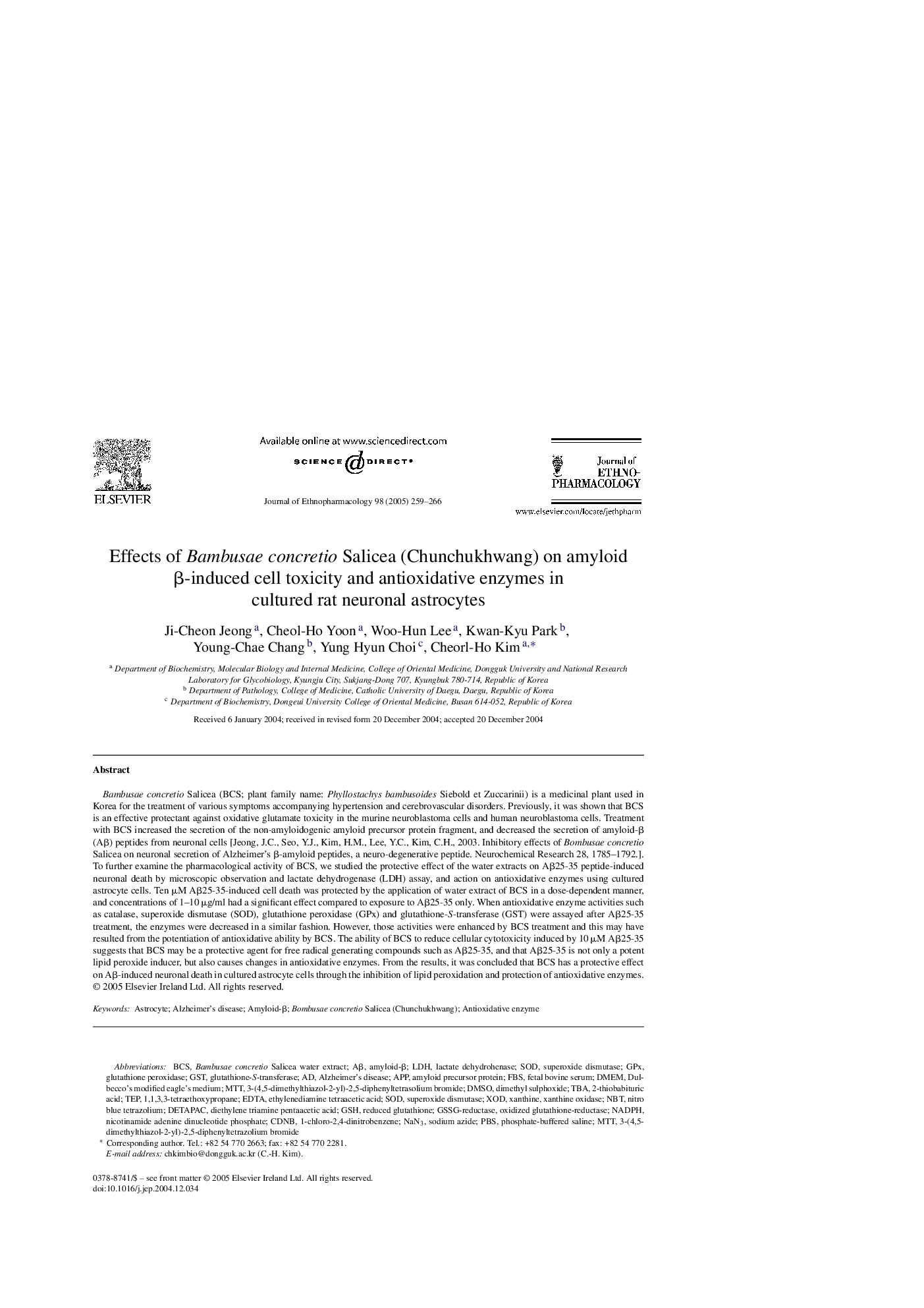| Article ID | Journal | Published Year | Pages | File Type |
|---|---|---|---|---|
| 9009798 | Journal of Ethnopharmacology | 2005 | 8 Pages |
Abstract
Bambusae concretio Salicea (BCS; plant family name: Phyllostachys bambusoides Siebold et Zuccarinii) is a medicinal plant used in Korea for the treatment of various symptoms accompanying hypertension and cerebrovascular disorders. Previously, it was shown that BCS is an effective protectant against oxidative glutamate toxicity in the murine neuroblastoma cells and human neuroblastoma cells. Treatment with BCS increased the secretion of the non-amyloidogenic amyloid precursor protein fragment, and decreased the secretion of amyloid-β (Aβ) peptides from neuronal cells [Jeong, J.C., Seo, Y.J., Kim, H.M., Lee, Y.C., Kim, C.H., 2003. Inhibitory effects of Bombusae concretio Salicea on neuronal secretion of Alzheimer's β-amyloid peptides, a neuro-degenerative peptide. Neurochemical Research 28, 1785-1792.]. To further examine the pharmacological activity of BCS, we studied the protective effect of the water extracts on Aβ25-35 peptide-induced neuronal death by microscopic observation and lactate dehydrogenase (LDH) assay, and action on antioxidative enzymes using cultured astrocyte cells. Ten μM Aβ25-35-induced cell death was protected by the application of water extract of BCS in a dose-dependent manner, and concentrations of 1-10 μg/ml had a significant effect compared to exposure to Aβ25-35 only. When antioxidative enzyme activities such as catalase, superoxide dismutase (SOD), glutathione peroxidase (GPx) and glutathione-S-transferase (GST) were assayed after Aβ25-35 treatment, the enzymes were decreased in a similar fashion. However, those activities were enhanced by BCS treatment and this may have resulted from the potentiation of antioxidative ability by BCS. The ability of BCS to reduce cellular cytotoxicity induced by 10 μM Aβ25-35 suggests that BCS may be a protective agent for free radical generating compounds such as Aβ25-35, and that Aβ25-35 is not only a potent lipid peroxide inducer, but also causes changes in antioxidative enzymes. From the results, it was concluded that BCS has a protective effect on Aβ-induced neuronal death in cultured astrocyte cells through the inhibition of lipid peroxidation and protection of antioxidative enzymes.
Keywords
APPNBTCDNBGPXAβGSTGSHNADPHTEPTBANaN3XODDETAPAC1,1,3,3-tetraethoxypropaneFBSDMEMPBS1-chloro-2,4-dinitrobenzene3-(4,5-dimethylthiazol-2-yl)-2,5-diphenyltetrazolium bromideDMSODulbecco's modified Eagle's mediumMTTAstrocyteamyloid-βAntioxidative enzymeEDTAethylenediamine tetraacetic aciddiethylene triamine pentaacetic acidAlzheimer's diseasenitro blue tetrazoliumdimethyl sulphoxideBCsSODsodium azidefetal bovine serumSuperoxide dismutaseLDHPhosphate-buffered salinenicotinamide adenine dinucleotide phosphateamyloid precursor proteinreduced glutathioneglutathione-S-transferaseglutathione peroxidase
Related Topics
Health Sciences
Pharmacology, Toxicology and Pharmaceutical Science
Pharmacology
Authors
Ji-Cheon Jeong, Cheol-Ho Yoon, Woo-Hun Lee, Kwan-Kyu Park, Young-Chae Chang, Yung Hyun Choi, Cheorl-Ho Kim,
